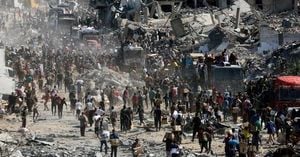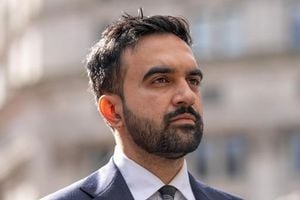The abrupt removal of Gen. Nicolas Torre III as chief of the Philippine National Police (PNP) has sent ripples through the country’s political and law enforcement circles, with Vice President Sara Duterte weighing in from The Hague, Netherlands, where she is visiting her father, former President Rodrigo Duterte. The former president remains in the custody of the International Criminal Court (ICC) on charges of crimes against humanity related to his administration’s controversial war on drugs.
“I cannot say if it’s karma or not as it is only God who can say what a person deserves,” Vice President Duterte said during a recent interview in The Hague, according to Cebudailynews and corroborated by multiple local sources. She added a philosophical note: “Maybe it is part of his journey in his life. Sometimes you’re on top and then 85 days later you’re at the bottom.” The vice president’s comments, while carefully avoiding direct criticism or speculation, underscore the unpredictability of power and fate in the Philippines’ turbulent political landscape.
The shake-up at the helm of the PNP came just three months after Torre’s appointment. President Ferdinand Marcos Jr. ordered the removal “effective immediately,” with Executive Secretary Lucas Bersamin formalizing the directive in a letter dated August 25, 2025. By August 26, Torre was officially relieved of his post, and Police Lt. Gen. Jose Melencio Nartatez Jr. was installed as the new chief during a turnover ceremony at Camp Crame, presided over by Interior Secretary Jonvic Remulla.
Behind the scenes, Torre’s ouster was reportedly triggered by a clash with Secretary Remulla over the reshuffling of 13 senior police officials. Notably, among those affected was Nartatez, who would ultimately succeed Torre. The friction over personnel decisions hints at deeper struggles within the country’s security apparatus, where jockeying for influence and loyalty is nothing new.
Gen. Torre’s career trajectory has been anything but ordinary. Before his brief stint as PNP chief, he led the Criminal Investigation and Detection Group (CIDG) unit that executed the ICC arrest of Rodrigo Duterte in March 2025, a move that drew both international attention and domestic controversy. Torre had also previously served as the regional police chief of Davao, where he oversaw the arrest of Apollo Quiboloy, a powerful religious leader and longtime Duterte ally who faces serious criminal allegations.
Quiboloy, leader of the Kingdom of Jesus Christ, has long been a polarizing figure in the Philippines. He faces sex trafficking, bulk cash smuggling, and immigration fraud charges in the United States, as well as human trafficking and child abuse complaints from former church members in the Philippines. According to the Department of Justice, any extradition to the U.S. must wait until local cases are resolved—a process that could take months, if not years. Still, the path to Quiboloy’s extradition appears to have been mapped out well in advance.
Vice President Duterte, in her interview from The Hague, claimed that Quiboloy’s looming extradition was part of a pre-arranged strategy. “I already told everything to pastor Apollo Quiboloy… the information we got from the House of Representatives,” she said, referencing discussions sparked by a privilege speech from former PBA party-list representative Migs Nograles. Duterte outlined the alleged plan: local cases would be filed first, leading to his arrest; then, after those charges were dismissed, Quiboloy would be turned over to U.S. authorities. Her remarks suggest that high-level political maneuvering continues to shape the fate of powerful figures facing international scrutiny.
The timing of Torre’s dismissal, just 85 days after his appointment, has fueled speculation about the real reasons behind his removal. Was it simply the result of a personnel dispute, or did his role in the arrest of both Duterte and Quiboloy make him a political liability? While Vice President Duterte refrained from making direct accusations, her comments about fate and divine justice have only added to the intrigue. “So, maybe that’s just part of his journey in life. Sometimes, you’re at the top, and then 85 days later, you’re at the bottom. That’s it,” she said, echoing her earlier sentiment that only God can judge what someone deserves.
The leadership change at the PNP comes at a delicate moment for the Philippines. The country’s law enforcement agencies are under intense international and domestic scrutiny, with the ICC’s case against Rodrigo Duterte casting a long shadow. The vice president’s visit to The Hague coincided with preparations for a confirmation of charges hearing against her father, scheduled for September 23, 2025. Meanwhile, Sara Duterte is set to continue her overseas advocacy, confirming she will fly to Japan on September 21–22 to meet with the Filipino community as part of the “Free Duterte” campaign. “Japan (trip) will proceed. It was already set by the Filipino community,” she told reporters. This will mark her 13th foreign trip of the year, underscoring her active role on the international stage even as her father remains detained.
President Marcos Jr.’s decision to remove Torre and swiftly install Nartatez as the new PNP chief was executed with little public explanation. The official line points to internal disagreements over police reshuffling, but observers note the broader political context: the PNP’s leadership has become a focal point in the ongoing tug-of-war between the current administration, the Duterte family, and their allies and detractors. The swift turnover and the lack of detailed reasoning from Malacañang have left the public speculating about the underlying dynamics at play.
For now, the PNP faces the challenge of maintaining stability and public trust amid leadership changes and political pressures. The new chief, Lt. Gen. Nartatez, steps into the role at a time of heightened expectations and scrutiny—not just from within the force, but from a public keenly aware of the stakes involved. As for Gen. Torre, his fall from the top after just 85 days is a stark reminder of the volatility of power in the Philippines, where yesterday’s hero can quickly become today’s casualty.
As the ICC proceedings against Rodrigo Duterte move forward and the fate of figures like Quiboloy hangs in the balance, the events surrounding Torre’s removal serve as a microcosm of the larger struggles shaping the nation. With political fortunes rising and falling in rapid succession, the only certainty appears to be uncertainty itself.



